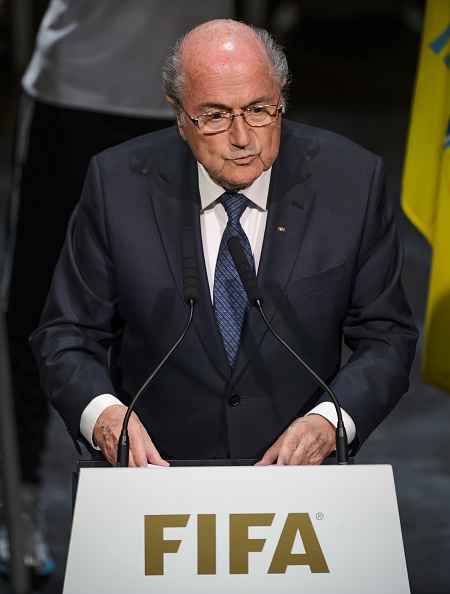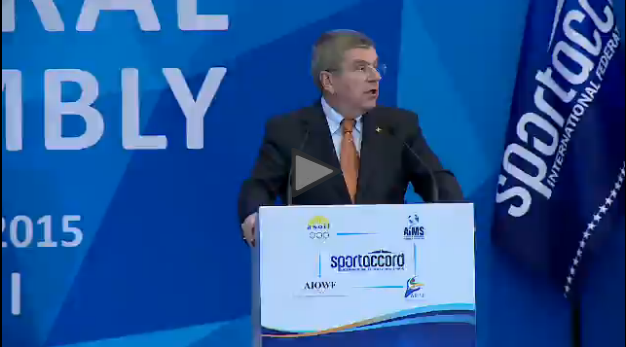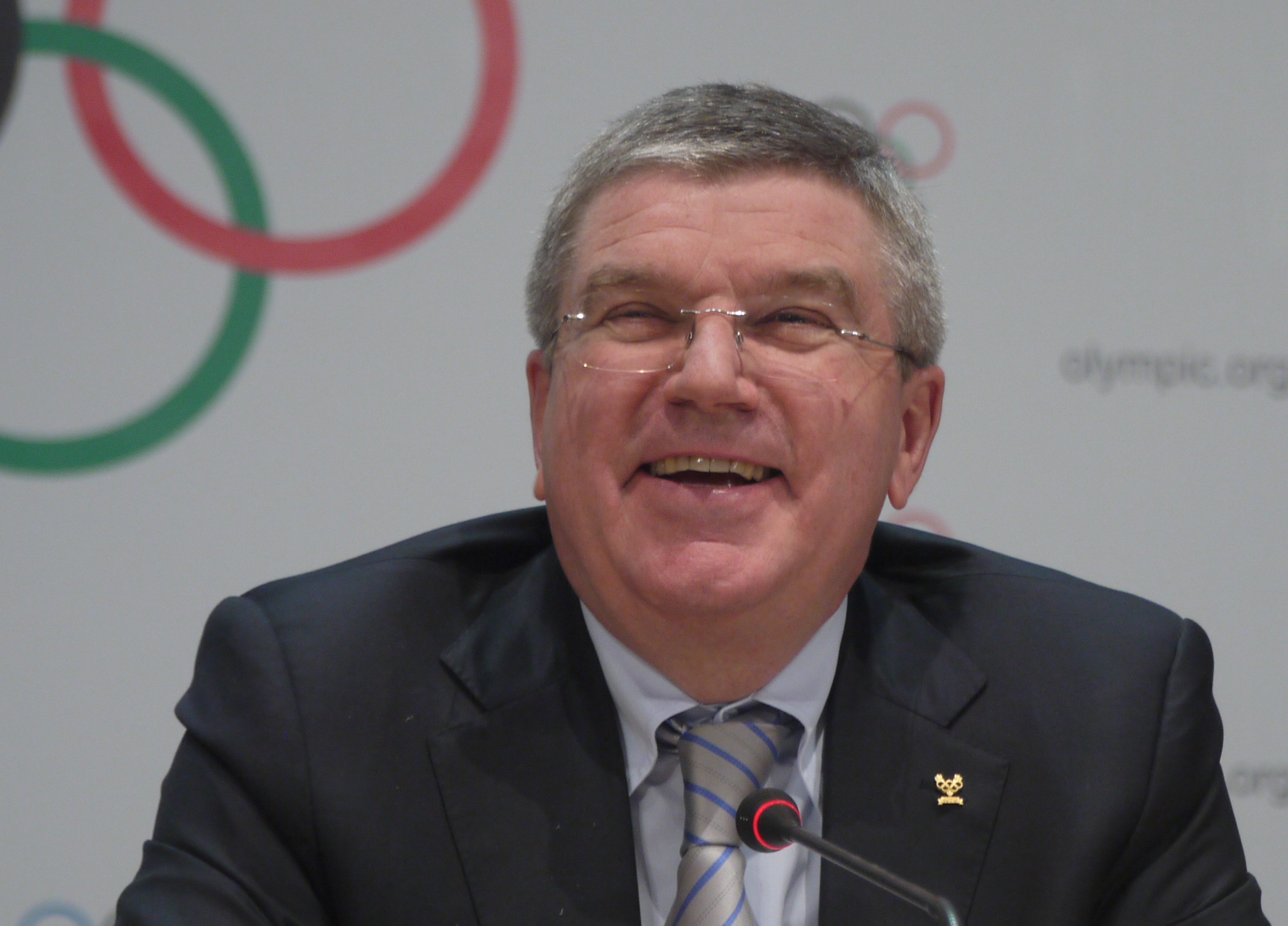EUGENE, Oregon — You know who looks like geniuses right about now? Vin Lananna here at so-called TrackTown USA and Max Siegel, chief executive of USA Track & Field. They were two of the keys to bringing track and field’s world championships to Eugene in 2021. That might be the last hurrah.
In the aftermath of the FIFA indictments, it likely may be a generation or more before the United States sees a World Cup played here, women’s or men’s. And the U.S. Olympic Committee’s 2024 bid, now centered on Boston? The International Olympic Committee won’t vote on 2024 until 2017 but this Boston bid can now be presumed to be DOA.
U.S. and European mainstream news reports may be hailing the U.S. Justice Department’s decision to go after some of the sport’s heavyweights — the indictments, unsealed Wednesday, charge nine soccer officials and five marketing executives.
Sepp Blatter, the head of FIFA, was not charged. In a statement Thursday before the vote Friday in Zurich at which he is widely expected to be re-elected to a fifth, four-year term, he said, “We, or I, cannot monitor everyone all of the time. If people want to do wrong, they will also try to hide it. But it must also fall to me to be responsible for the reputation of our entire organization, and to find a way to fix things.
“We cannot allow the reputation of FIFA to be dragged through the mud any longer. It has to stop here and now.”
FIFA has ruled out a revote of the World Cup bids won by Russia for 2018 and Qatar for 2022.
Big picture:
This is a highly charged game of international politics and intrigue where what the U.S. Justice Department does or doesn’t do, or says or doesn’t say, is hardly the final word.
Indeed, it’s unclear how these indictments, or the prospect of further investigation or indictment, furthers any American criminal or international agenda.
The DOJ as world's self-appointed sheriff
Just to set out the fundamental premise and ask the elemental question:
The United States is hardly a major soccer nation. Who in the United States was harmed by alleged wrongdoing or misconduct involving FIFA?
Assuming extradition, and you can bet that some of these defendants can, and will, have access to some superior legal minds:
If the government of some country — say, for hypothetical purposes, South Africa — pays someone a “bribe,” is that actually a crime? If so, why?
What about the notion of sovereign immunity?
What about this: is it illegal to take money from a government?
Can’t the argument be made that this all rather smacks of politics and the generation of headlines — in particular for a brand-new attorney general, Loretta Lynch?
Come on: this went down at the FIFA Congress? That wasn’t on purpose?
Did anyone along the way — repeat, anyone — stop to consider or coordinate the multiple levels of U.S. policy internationally?
To be clear: not to say that FIFA might not be exceedingly worthy of investigation or inquiry.
To underscore: the amount of newsprint and digital pixelation that has been given over to allegations of wrongdoing or misconduct at FIFA over the years is monumental.
But who decided that the United States of America ought to be the self-appointed problem solver, to ride in like the sheriff in an old western, and right whatever wrongs might be wrong in this particular soccer movie? Like, why?
How’s that going for the United States in other areas of public policy — for instance, Iraq and Afghanistan?
We don’t have enough issues back home, the federal budget isn’t strained enough, and this is the priority? Baltimore is melting down, Ferguson, too, and the Justice Department is chasing soccer balls in Zurich?
If all this was the first step in a grand plot to take down Blatter, how long is that going to take? Long enough to play out through 2017, and the IOC process for voting for the 2024 Summer Games? Looking at that through an American prism -- if that's the case, is that a likely good thing for a U.S. Olympic bid?
How about this? You can bet — take it to the window in Vegas — that senior officials overseas with even the most fundamental understanding of the American system will make this connection, right or wrong, fair or not:
One, President Obama is known to have been exceedingly frustrated, or worse, after he made an in-person appeal in Copenhagen in 2009 at the IOC session on behalf of his own city, Chicago, and the members booted Chicago out in the first round of voting.
Two, President Obama is the head of the executive branch of the American system.
Three, the Justice Department is part of the executive branch.
Draw whatever conclusions you wish.
Again, it does not matter whether it is right or not, fair or unfair.
What matters in international sport
What matters in the nuanced world of high-level international sport and politics is perception and relationships.
Newspaper headlines can scream and blare and proclaim all they want.
Whatever.
So when, for instance, Sunil Gulati of the U.S. Soccer Federation says Thursday that he intends to instruct the American delegate to vote Friday for Blatter’s challenger, Jordan’s Prince Ali bin al-Hussein of Jordan, where — afterward, and for a long time — can that expect to leave U.S. Soccer?
Start naming your wildernesses here, because FIFA under Blatter has operated with what Ali has called a culture of “retribution.”
As the New York Times put it, blandly: “Anti-American sentiment is not unusual in international sports, and the involvement of the Department of Justice in Wednesday’s arrests will not help the United States’s image.”
The Russian president, Vladimir Putin, was — as usual — more forceful.
He called Wednesday’s arrests of top FIFA officials in Zurich “another blatant attempt by the United States to extend its jurisdiction to other states.”
And: “I have no doubt that this is obviously an attempt to prevent Mr. Blatter’s re-election to the post of FIFA president, which is a grave violation of the principles that international organizations function on.”
And: “Unfortunately, our American partners use these methods to achieve their selfish goals and persecute people illegally. I don’t rule out that this may be the same case with FIFA.”
So — if you are the USOC and you are weighing whether to keep up this charade of a Boston bid, with its dubiously low polling numbers and a plan that is not a plan, with leaders who were not even the leaders when the USOC picked it last January, now you’ve got Putin even more upset at the United States and Blatter, too.
Ah, you say — Blatter is 79 and by IOC rules he has to go off at 80.
But wait — under the new Agenda 2020 protocols, the IOC can grant waivers to five members to stay on past 80. So far, the IOC has awarded only one of the five, to the president of the skiing federation, Gian-Franco Kasper. That leaves four. Doesn’t it seem highly likely the president of almighty FIFA would get one of the remaining four?
As for Putin — it is always worth remembering, as this space points out time and again, that the very first call IOC president Thomas Bach received upon his election in Buenos Aires in 2013 was from Putin.
Russia has — for at least a few more months — four IOC members. Vitaly Smirnov is the dean of the members; he turned 80 in February. The chair of the 2022 evaluation commission is Russia’s Alexander Zhukov. Obviously, the 2014 Winter Games were in Russia, in Sochi.
Given the country’s prominence in the Olympic movement, it would hardly be surprising if, by 2017, there were again four Russian members.
Even at three, Russia holds considerable Olympic influence.
Keep in mind that London beat Paris by four votes, 54-50, for the 2012 Summer Games — which means, really, by a swing of two votes.
Blatter’s influence in the one-nation, one-vote FIFA system is in Asia, Africa and South America.
As for the Europeans, who will be supporting Ali on Friday, come 2024, there figure to be at least three — Hamburg, Rome and Paris — and maybe four — Budapest — European cities in the Summer Games race.
It’s in the IOC’s interest to have an American candidate, so be sure that the only thing you’ll hear from Lausanne, Switzerland, where the IOC is based, is how interesting and promising the American bid is, or could be.
Bottom line: it's math
But let’s be real. This is a math problem. How does the USOC put together a winning coalition behind Boston? The Europeans have their interests. Putin and Blatter have long memories.
One other piece to the dynamic. Sheikh Ahmad al-Fahad al-Sabah of Kuwait, one of the most influential figures in the Olympic movement, the head of the 205-member Assn. of National Olympic Committees, was just last month elected to the FIFA executive council.
Long term: does the sheikh himself want to be the next FIFA president? The next IOC president? He’s only 51. Are his allegiances going to play more with Blatter? Bach? A question often asked: what does the sheikh want?
In late October, ANOC is due to have a meeting in Washington, D.C.
In the aftermath of the FIFA indictments, one now wonders just how many of the delegates are inclined to show up in Washington — or, perhaps, as October nears, to find a convenient excuse to kind-of sort-of you-know not show up, because showing up would give the FBI jurisdiction over their persons.
Hey, everyone, let’s take a field trip to the FBI academy in Quantico, Virginia! Rendition — no, we don’t call it that!
Not that anyone would be thinking anything like that — not after Chuck Blazer, once the top soccer official in the United States, identified as “co-conspirator #1” in paragraph 44 of the indictment, is said at the 2012 London Games to have secretly recorded former FIFA colleagues with a microphone hidden in the fob of his keychain.
At the London Games!
So let’s get this straight — the U.S. Department of Justice sought to use the former top U.S. Soccer official as a mole, as a rat, to gather evidence while at the IOC’s franchise, the Summer Games. Once that gets processed at the appropriate levels, that ought to go down just great for everyone in the United States in the Olympic scene for years and years to come.
Who, now, is going to have a cup of coffee in the bar with an American and wonder if the feds aren’t listening?
Blatter reportedly has not visited the U.S. in four years.
Justice and truth, such as they are, are very fine things.
Winning Olympic bids is quite another.
No one is saying the USOC could have done anything to have stopped the Justice Department from doing its thing.
But now the USOC has to live with the consequences.
Spending $75 million, or more, in chase of something that is not attainable is not a good idea. That money is not the USOC’s money, nor is it the IOC’s money, but it’s still a lot of money, and at the end this all comes down to relationships, perception — and math.
The USOC meets in late June in the Bay Area to consider what it ought to do next.
It should be obvious.







